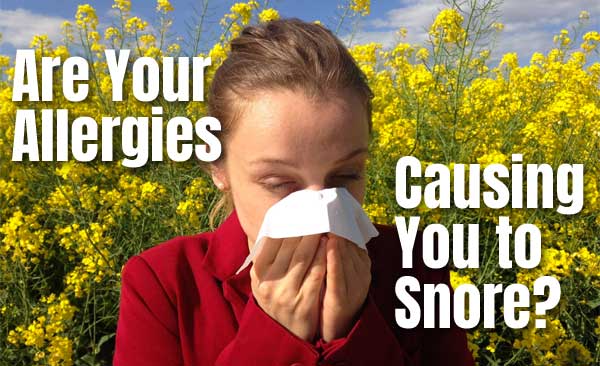First of all, can allergies and asthma cause snoring?
According to the National Sleep Foundation, allergies can affect sleep because allergens typically cause nasal congestion. In fact, they state that obstructive sleep apnea (OSA) is actually linked with allergic rhinitis.

How Do Allergies Affect Snoring?
When the nasal passages get congested, the airways get smaller, thus making the person more susceptible to snoring. Therefore, if we can we can reduce the congestion, we can sometimes alleviate the snoring as well.
Common allergens include outdoor particles and pollen from grasses and trees. Plus, people can be allergic to indoor allergens such as mold, dust mites and pet dander.
How to Reduce Dust Allergies and Snoring:
Of course, minimizing contact with these offensive particles can help relieve congestion and other symptoms. SnoreLab suggests investing in an air purifier and vacuuming your house more often.

Note: If you have cats or dogs that shed, these simple steps might help greatly. Not to mention, pets can bring a lot of outdoor allergens indoors.
You may not be allergic to your pet, but what about the freshly-cut grass they just rolled around in outside?
In addition, consider washing your bedding more frequently, flipping your mattress more often or using allergy-proof mattress covers. Switch from curtains to blinds and wipe down hard surfaces often to prevent dust accumulation.
 Also, using a Neti Pot to rinse out your sinuses can help clear out particles ad potential allergens throughout the day.
Also, using a Neti Pot to rinse out your sinuses can help clear out particles ad potential allergens throughout the day.
Neti Pots can sometimes provide an easy solution for those who suffer from seasonal allergies like hay fever that impact them every year.
Food Allergies and Snoring?
 According to Pharmacist Suzy Cohen, certain foods can greatly increase snoring. Specifically eggs, milk and cod.
According to Pharmacist Suzy Cohen, certain foods can greatly increase snoring. Specifically eggs, milk and cod.
These 3 foods are known to produce an allergic reaction in the adenoids and tonsils, causing them to swell.
The adenoids are located in the upper airway, and as you can imagine, they can cause snoring problems when swollen.
Also consider other potential food allergies, like snoring and gluten intolerance.
Can Snoring then Make Your Allergy Symptoms Worse?
Because allergies can impact snoring, this symptom can also result in poor sleep. In turn, we can wake up the following day feeling tired and unrested.
Lack of sleep can wear down our immune system and then make us more vulnerable to illness. In fact, Dr Grossan of the Grossan Sinus and Health Institute says that a depressed immune system can lead to a sinus infection. Of course, this won’t help the snoring situation either.
 Not to mention sleep affects learning in children. Thus, we have another reason to take care of allergy issues and inflammation sooner rather than later.
Not to mention sleep affects learning in children. Thus, we have another reason to take care of allergy issues and inflammation sooner rather than later.
In fact, the Snoring Center says that many allergy sufferers complain of fatigue. And, guess what? We can often attribute that fatigue to nighttime snoring.
Note: By the way, we can also get a stuffy nose or sneezing from what’s called Nonallergic Rhinitis. Often, we don’t know the cause.
However, it can be due to a weather change, chlorine, car exhaust, cleaning products, laundry detergents or smog. In other words, many factors in our environment can have an effect.
How to Fix Allergies and Snoring – Natural Treatments
We have good news, though. You don’t have to suffer with allergic symptoms forever. Nor do you have to resort to taking ongoing medication or have a medical procedure done.
 Often, we can make simple lifestyle changes or change our environment to prevent the allergies from happening. Or, we can at least minimize their impact on us (and our sleep!).
Often, we can make simple lifestyle changes or change our environment to prevent the allergies from happening. Or, we can at least minimize their impact on us (and our sleep!).
For example, the Mayo Clinic reports that losing weight, avoiding alcohol close to bedtime or sleeping on your side can help stop snoring. (See more on snoring and sleep position.)
Dr Josh Axe also has some suggestions to minimize snoring due to allergies. Watch the video below for ideas.

More Sleep & Snoring Home Remedies:
In addition, some people use inexpensive mouth tape to prevent snoring. You can also get a small and unobtrusive snoring mouthpiece that you can travel with or an anti-snore pillow, like a wedge cushion.
On the other hand, if you suffer from seasonal allergies, you may want to look into a nose piece for snoring.
